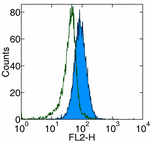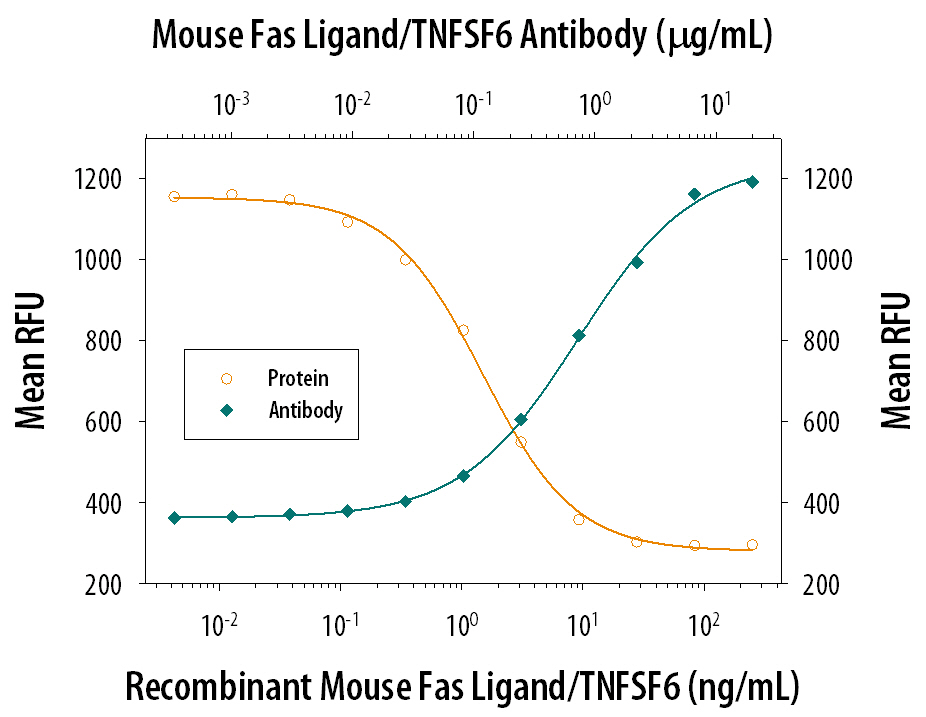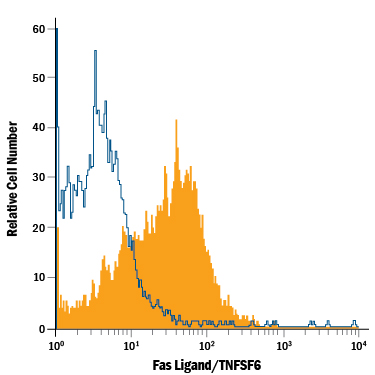Fasl
| Gene Symbol | Fasl |
|---|---|
| Entrez Gene | 14103 |
| Alt Symbol | APT1LG1, CD178, CD95-L, CD95L, Fas-L, Faslg, Tnfsf6, gld |
| Species | Mouse |
| Gene Type | protein-coding |
| Description | Fas ligand (TNF superfamily, member 6) |
| Other Description | CD95 ligand|Fas antigen ligand|generalized lymphoproliferative disease|tumor necrosis factor ligand superfamily member 6 |
| Swissprots | P41047 Q61217 Q9R1F2 |
| Accessions | AAD14773 ABI24108 ABI24109 ABI24110 EDL39311 P41047 AF119335 AAD52106 AF288572 AAG60016 AK040139 BAC30520 AK141268 BAE24625 BC052866 AAH52866 DQ846747 ABI24111 S76752 AAB33780 U06948 AAA17800 U10984 AAA19778 U58995 AAB02915 XM_006496653 XP_006496716 XM_006496654 XP_006496717 NM_001205243 NP_001192172 NM_010177 NP_034307 |
| Function | Cytokine that binds to TNFRSF6/FAS, a receptor that transduces the apoptotic signal into cells. May be involved in cytotoxic T-cell mediated apoptosis and in T-cell development. TNFRSF6/FAS-mediated apoptosis may have a role in the induction of peripheral tolerance, in the antigen-stimulated suicide of mature T-cells, or both. Binding to the decoy receptor TNFRSF6B/DcR3 modulates its effects (By similarity). {ECO:0000250}. |
| Subcellular Location | Tumor necrosis factor ligand superfamily member 6, soluble form: Secreted. Note=May be released into the extracellular fluid, probably by cleavage form the cell surface. |
| Top Pathways | Chagas disease (American trypanosomiasis), PI3K-Akt signaling pathway, Non-alcoholic fatty liver disease (NAFLD), Herpes simplex infection, Proteoglycans in cancer |
FAS-L (Kay-10) - sc-19988 from Santa Cruz Biotechnology
|
||||||||||
Anti-Fas Ligand antibody - ab18373 from Abcam
|
||||||||||
Anti-Fas Ligand antibody [MFL3] (Phycoerythrin) - ab93566 from Abcam
|
||||||||||
Anti-Fas Ligand antibody [MFL3] - Low endotoxin, Azide free - ab171253 from Abcam
|
||||||||||
Anti-Fas Ligand antibody [MFL4] - ab84605 from Abcam
|
||||||||||
Fas Ligand/TNFSF6 Antibody (A11) - NBP1-97519 from Novus Biologicals
|
||||||||||
Fas Ligand/TNFSF6 Antibody - AF526 from Novus Biologicals
|
||||||||||
Fas Ligand/TNFSF6 Antibody - NBP1-45557 from Novus Biologicals
|
||||||||||
Fas Ligand/TNFSF6 Antibody (MFL4) - NBP1-43275 from Novus Biologicals
|
||||||||||
Fas Ligand/TNFSF6 Antibody (Kay-10) - NB100-77497 from Novus Biologicals
|
||||||||||
Fas Ligand/TNFSF6 Antibody (MFL3) - NBP1-43276 from Novus Biologicals
|
||||||||||
Fas Ligand/TNFSF6 Antibody [Biotin] - BAF526 from Novus Biologicals
|
||||||||||
Fas Ligand/TNFSF6 Antibody (H11) [Biotin] - NBP1-97621 from Novus Biologicals
|
||||||||||
Fas Ligand/TNFSF6 Antibody (101624) [Allophycocyanin] - FAB526A from Novus Biologicals
|
||||||||||
Fas Ligand/TNFSF6 Antibody (H11) [FITC] - NBP1-97649 from Novus Biologicals
|
||||||||||
Fas Ligand/TNFSF6 Antibody (MFL4) [FITC] - NBP1-28810 from Novus Biologicals
|
||||||||||
Fas Ligand/TNFSF6 Antibody (MFL4) [Allophycocyanin] - NBP1-43275APC from Novus Biologicals
|
||||||||||
Fas Ligand/TNFSF6 Antibody (MFL4) [DyLight 350] - NBP1-43275UV from Novus Biologicals
|
||||||||||
Fas Ligand/TNFSF6 Antibody (MFL4) [DyLight 680] - NBP1-43275FR from Novus Biologicals
|
||||||||||
Fas Ligand/TNFSF6 Antibody (MFL4) [7C] - NBP1-43275V2 from Novus Biologicals
|
||||||||||
Fas Ligand/TNFSF6 Antibody (MFL4) [DyLight 405] - NBP1-43275V from Novus Biologicals
|
||||||||||
Fas Ligand/TNFSF6 Antibody (MFL4) [Alexa Fluor (R) 700] - NBP1-43275AF700 from Novus Biologicals
|
||||||||||
Fas Ligand/TNFSF6 Antibody (MFL4) [Alexa Fluor (R) 647] - NBP1-43275AF647 from Novus Biologicals
|
||||||||||
Fas Ligand/TNFSF6 Antibody (MFL4) [Alexa Fluor (R) 488] - NBP1-43275AF488 from Novus Biologicals
|
||||||||||
Fas Ligand/TNFSF6 Antibody (MFL4) [Alexa Fluor (R) 405] - NBP1-43275AF405 from Novus Biologicals
|


![Immunohistochemistry-Paraffin: Fas Ligand Antibody (A11) [NBP1-97519] - Immunohistochemical localization of FasL in adult mouse testis using the A11 antibody.](http://www.bioprodhub.com/system/product_images/ab_products/5/sub_7/11637_Fas-Ligand-Antibody-(A11)-Immunohistochemistry-Paraffin-NBP1-97519-img0001.jpg)

![Western Blot: Fas Ligand/TNFSF6 Antibody [NBP1-45557] - Analysis of FasL expression in rat kidney tissue lysate.](http://www.bioprodhub.com/system/product_images/ab_products/5/sub_10/12766_Fas-Ligand-TNFSF6-Antibody-Western-Blot-NBP1-45557-img0002.jpg)
![Flow Cytometry: Fas Ligand Antibody (MFL4) [NBP1-43275] - See notes for image caption](http://www.bioprodhub.com/system/product_images/ab_products/5/sub_4/15845_Fas-Ligand-Antibody-%2528MFL4%2529-Flow-Cytometry-NBP1-43275-img0002.jpg)
![Flow Cytometry: Fas Ligand Antibody (Kay-10) [NB100-77497] - Mouse Fas Ligand transfected cells stained with purified KAY-10, followed by biotinylated anti-mouse IgG and Sav-PE](http://www.bioprodhub.com/system/product_images/ab_products/5/sub_4/15954_Fas-Ligand-Antibody-%2528Kay-10%2529-Flow-Cytometry-NB100-77497-img0001.jpg)
![Flow Cytometry: Fas Ligand Antibody (MFL3) [NBP1-43276] - Surface staining of mouse Fas Ligand-transfected cells with Anti-Mouse CD178 (Fas Ligand) PE. Appropriate isotype controls were used (open histogram). Total viable cells were used for analysis.](http://www.bioprodhub.com/system/product_images/ab_products/5/sub_5/2536_Fas%2520Ligand%2520Antibody%2520%2528MFL3%2529-Flow%2520Cytometry-NBP1-43276-img0001.jpg)
![Immunocytochemistry/Immunofluorescence: Fas Ligand Antibody (H11) [Biotin] [NBP1-97621] - Detection of FasL in 293T cells transfected with a FasL expression vector. Method: Transfected cells were plated onto polylysine treated glass slides, fixed and permeabilized in methanol at -20C for 5 min, then in acetone at -20C for 30 sec. After 3 washes in PBS, 0.1% BSA, were incubated for 1 hr at room temperature with 20 ug/ml of biotinylated H11 antibody in PBS, 0.1% BSA. After rinsing in PBS, FITC-conjugated streptavidin was added for 30 min, slides washed again in PBS and visualized using a fluorescence microscope.](http://www.bioprodhub.com/system/product_images/ab_products/5/sub_5/13893_Fas-Ligand-Antibody-%2528H11%2529-%255BBiotin%255D-Immunocytochemistry-Immunofluorescence-NBP1-97621-img0002.jpg)

![Flow Cytometry: Fas Ligand Antibody (H11) [FITC] [NBP1-97649] - Profile of 293T cells transiently transfected with a FasL-expression plasmid (filled profile). The open profile corresponds to mock-transfected 293T cells. Method: FasL-transfected 293T cells (5 x 10^5) were incubated on ice for 30 min in 50 ul FACS buffer (PBS, 5% Fetal calf serum, 0.02% azide) containing 1ug of FITC-labelled H11 antibody. After washing in FACS buffer, cells were anlyzed by flow cytometry. Do not exclude pre-apoptotic cells during data acquisition (see T. Renno, M. Hahne, J. Tschopp and H. R. MacDonald, J. Exp. Med., 183, 431 (1996)).](http://www.bioprodhub.com/system/product_images/ab_products/5/sub_5/14025_Fas-Ligand-Antibody-%2528H11%2529-%255BFITC%255D-Flow-Cytometry-NBP1-97649-img0001.jpg)
![Flow Cytometry: Fas Ligand Antibody (MFL4) [FITC] [NBP1-28810] - transfected cells with Hamster anti Mouse CD178:FITC](http://www.bioprodhub.com/system/product_images/ab_products/5/sub_5/14450_Fas%2520Ligand%2520Antibody%2520%2528MFL4%2529%2520%255BFITC%255D-Flow%2520Cytometry-NBP1-28810-img0001.jpg)